July was a busy, busy month for the Search Industry, with updates arriving almost every day.
In this post, we discuss the most important search industry developments, giving you the key details quickly - and highlighting what these changes mean for your business.
Read on for all the essential updates from July 2024!
Table of contents
Google Search
Google scraps plan to deprecate third-party cookies
Despite disapproval from online privacy advocacy groups, Google plans to continue using third-party cookies across its services.
Instead of ousting third-party cookies outright, Google wants to experiment with ways of helping users make informed decisions about permissions.
This may come as a relief to marketers, but it's important not to get ahead of ourselves. Given a clear choice, many users will likely block third-party cookies on Google.
Then again, some third-party cookies are better than no third party cookies, especially if Google continues to test ways to fill in the gaps.
July was a volatile time on the SERPs
There has been an unusual amount of ranking turbulence on the SERPs as of late. This means that there have been a lot of unexpected rank fluctuations.
The volatility started in early July, had some ups and downs, and then peaked on the 31st.
As shown in the SEMRush Sensor reports below, the US endured the most SERPs instability. UK SERPs were comparatively calm mid-July and have since spiked dramatically.
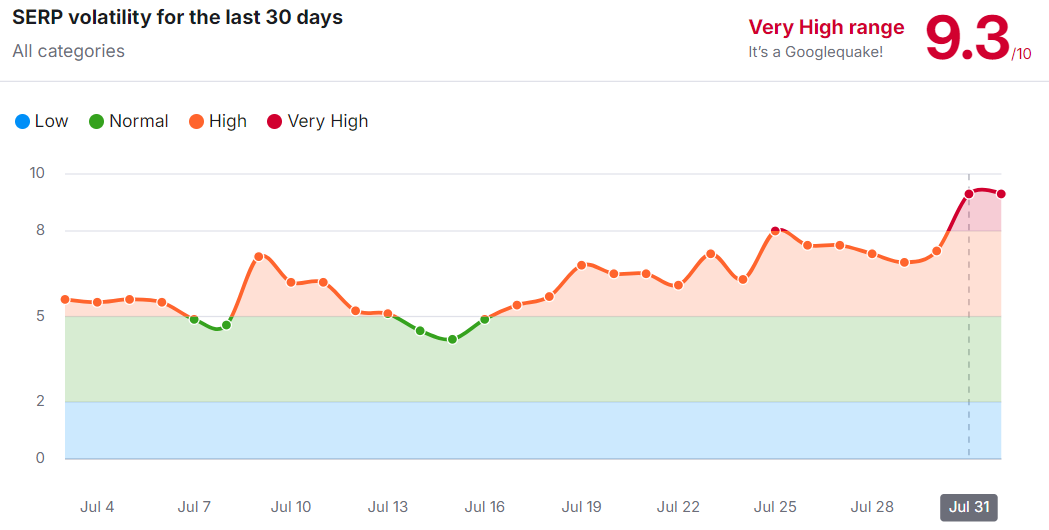
US SERPs volatility report
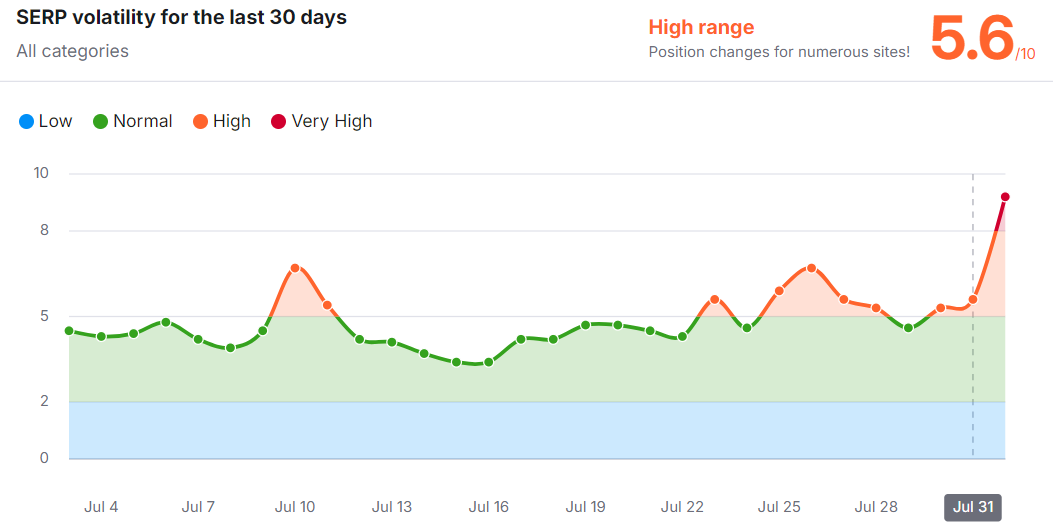
UK SERPs volatility report
Google is yet to comment on this extended ranking volatility, but it seems likely that it involved some form of algorithmic testing in preparation for their latest core algorithm update, released August 15th.
Study reveals nearly 60% of Google searches are 'zero click'
Published July 1st, the 2024 edition of an annual Sparktoro study on Google zero-click searches revealed that only 360 US searches out of every 1000 result in the user clicking through to a website.
It’s a similar story for EU users, with a click-in-search-rate of 374 out of every 1000 searches, meaning around 54% of sessions are zero-click searches.
Upwards of 20% of both US and EU zero-click sessions are ended by the user instigating another search, while around 37% of all Google searches are dead-end sessions with no further action.
Only 1.4% and 1% of all Search clicks go to a paid ad in Europe and the US, respectively.
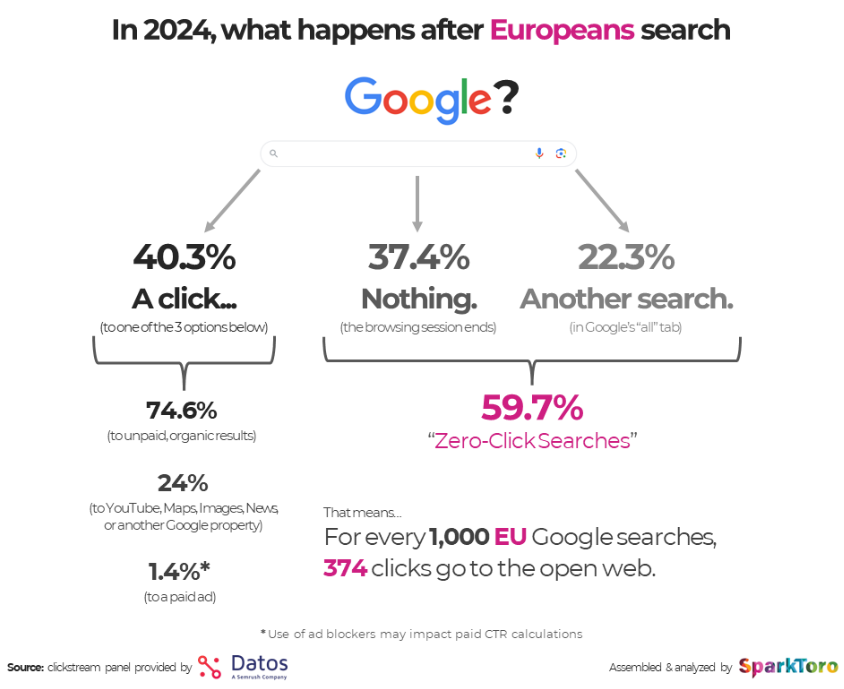
Source: 2024 Zero-Click Search Study
Although the study found that, on the whole, zero-clicks are in decline, 24% of all European clicks and nearly 30% of all US clicks that do come from a Google Search lead to another Google entity - think Maps, YouTube, Images, etc.
This marks a significant increase of self-contained Google traffic over the last couple of years. It suggests Google is becoming increasingly successful at hemming users into its ecosystem, something the company has been keen on for some time.
So, as far as publishers are concerned, zero-click sessions are still an issue.
To pull some of this traffic back, it’s crucial to optimise content for maximum exposure on the SERPs. Some strategies for doing so include:
- Optimising content for increased exposure in AI Overviews
- Targeting specific SERP features with your content
- Using structured data to ensure Google understands your content
- Leveraging increased visibility for local search by carrying out local SEO
Billions of URLs to stop working as Google retires link shortener
Google has announced that it will retire its Link Shortener in August 2025. This means that any URLs using the goo.gl redirect will stop working. When someone attempts to visit a page via one of these links, they will be met with a 404 error.
Starting August 23rd 2024, Google will start serving an interstitial page for a percentage of the affected links to let users know that the countdown has now begun - and the goo.gl link is not long for this world.
Google had this to say on the matter:
“Over time, the percentage of links that will show the interstitial page will increase until the shutdown date. This interstitial page should help you track and adjust any affected links that you will need to transition as part of this change. We will continue to display this interstitial page until the shutdown date after which all links served will return a 404 response.”
You can read Google’s full statement about the shutdown here.
Google leak reveals artificially generated content classification score
In the now infamous Google Search API leak of June 4th, a massive amount of the company’s proprietary data hit the web. Some of it hints at a possible classification score that measures the level of artificially generated content on a website.
Found in the ‘racterScores’ API reference of the leaked documents, this mechanism is referred to as a ‘Site-level AGC classification score’ - AGC standing for automatically generated content.
While Google has confirmed the authenticity of the leak, they warned against ‘making inaccurate assumptions about Search based on out-of-context, outdated, or incomplete information’ in the documents.
So, whether this is an actual classification currently in use is unknown.
ccTLDs confirmed as minor local ranking signal
It’s common knowledge that Google likes to present locally relevant content to users. However, only recently was it confirmed that using a ccTLD (country code top-level domain) gives you a slight boost in search.
ccTLDs are region-specific domains, like .uk, .us, .jp, etc.
This news came from Gary Illyes during a Google SEO office hours Q&A published on YouTube on July 18th.
Illyes remarks that using a ccTLD that corresponds with the language used by the searcher gives a website a very slight advantage on the SERPs compared to sites that use generic top-level domains, such as .com or .net.
Of course, this minor benefit is easily eclipsed by more important ranking signals, but it’s still something to bear in mind as part of a comprehensive understanding of SEO.
Site names, favicons & the search bar could be getting bigger on Google's SERPs
Google has been spotted testing out larger site names and favicons on their SERPs. As shown in the side-by-side comparison below, the difference is quite subtle.
Source: Search Engine Roundtable
The immediate benefit for users is enhanced skimmability, as well as greater accessibility for people with visual impairments. But we’re curious how this would play out on mobile, where there isn’t much wiggle room for scaling up.
It’s possible that this is the beginning of Google experimenting with more visual SERPs - and is perhaps a precursor to bigger changes in the vein of image search and VR adaptations.
Google has also been testing a longer search bar - presumably to keep more characters visible as queries become more conversational in response to generative and voice search.
Authorship is not a priority for Google
Publishing author names and bios has long been thought of as a good way to signal E.E.A.T (Experience, Expertise, Authoritativeness, Trustworthiness) to users and Google alike. But a Google spokesperson recently debunked this myth.
“I don’t know of such plans [to reinstate authorship structured data] and honestly I’m not very excited about anything along those lines, especially not one that is similar to what we had back in 2011 to 2013 because pretty much any markup that SEOs and site owners have access to will be in some form spam.”
That’s not to say you shouldn’t advertise that your content was written by a subject-matter expert, as it can help to build trust with readers. However, we shouldn’t expect it to have a direct impact on ranking potential.
Google to host more creator meetings
Following the September 2023 Helpful Content update, Google began hosting meetings with site owners to gather feedback on their updates directly from the SEO community.
There have been two “creator” meetings so far, and Google’s Danny Sullivan is keen to host more in the future.
According to Google’s John Mueller, feedback has been ‘really helpful in evaluations and discussions.’
Whether these sessions lead to any beneficial changes is yet to be seen, but it’s good to know that Google is listening to the people impacted the most by their algorithm updates.
Google is testing more ads in organic results
Google has been testing placing sponsored ads directly after organic featured snippets, pushing traditional results further down the page - and further away from the eyes of users.
This test was confirmed by Google’s Ginny Marvin via X, stating that it is ‘an ongoing evolution of dynamic ad placement on Search, and something we’ll continue to experiment with.’
Additionally, some have noticed double row carousel ads appearing on the SERPs here and there, as well as a new ad format labelled ‘People Also Browsed’. The details are unclear at present, but this format appears to present a row of suggested products that other users browsed following the same or similar queries.
Recent data pulled from SEMRush shows the frequency of Ads mixed into Google’s organic search results as 0.31% for desktop and 0.01% for mobile. But judging by Google’s tests, these figures could soon be rising.
Google tests new mobile search feature
Google has been testing a mobile search feature named “Hidden gem stores”.
This feature lists companies related to the search, alongside a thumbnail of one of their products. Clicking on a company in the list produces a drop-down menu showcasing merchant listings of popular products from their website.
It’s not currently known if this feature is related to Google’s Hidden Gems algorithm, which was rolled out in 2023 to help increase the visibility of user generated content (UGC) on SERPs.
Google may be replacing their dedicated 'X' SERP feature
Google is potentially replacing the X posts carousel SERP feature with a new feature called 'Latest Posts from.'
The updated carousel aggregates posts from a variety of social media platforms, including Threads, Instagram, and YouTube.
This follows a noted decrease in the visibility of the X carousel for news topics, suggesting a move towards a more generalised social media integration.
Google Discover sometimes served with a 'See AI Overview' button
As noted later in this post, AI Overviews are appearing less and less on the SERPs. However, Google has been experimenting with a manual overview generation button in Discover.
This button allows users to deepen their research into one of their Discover topics by swiftly pulling up an AI Overview. Google may be exploring ways to give users more control over when AI Overviews are displayed.
Google suggests HTML image elements are better for SEO
Google has updated its image SEO guidelines, now recommending the use of HTML image elements over other methods.
This change is intended to improve image indexing and search engine visibility, emphasising the importance of proper HTML formatting in SEO practices.
New Google Business Profile feature uses AI to create menus
Google Business Profiles (GBP) now allow restaurant owners to upload pictures of their menus, which Google's AI then transforms into detailed digital menus.
Google’s support page reminds users that this feature is experimental and fallible, so reviewing these AI generated menus before publishing them is a must.

Source: Google
AI Overviews
AI Overviews frequency down to record low of 7%
According to a BrightEdge report collating 10 key insights from their analysis of AI Overviews, Google’s AI responses are now only served to 7% of searches.
This is the lowest appearance rate documented to date.
Queries around education, entertainment and ecommerce saw the biggest dip in overviews triggered.
The report also revealed that citations for UGC (user generated content) sites have plummeted since the generative search assistant went live in the US. Reddit and Quora citations, for example, are conspicuously absent as of late, with visibility in AI Overviews plummeting 85.71% and 99.69% respectively.
Google is experimenting with ad placement in AI Overviews... again
Google is heading back to the lab, eager to find a way to integrate Search and Shopping Ads into AI Overviews that will neither detract from the user experience nor hinder the efficacy of sponsored content.
Tests will commence soon in the US and results will likely inform the approach taken in the UK.
Google testing new features in AI Overviews
Save button
This function would allow users to save an AI Overview to their Google “Interests” section for recall later.
If implemented, the impact on marketing would be minimal, but it could potentially lead to marginally fewer searches and possibly a slightly less dynamic SEO environment.
For example, while the live search visibility would have updated, users repeatedly referring to their saved overview may miss out on these new citations.
Jump-to-start button
Google has also been testing the waters with an overlaid ‘Overview’ button that appears on the UI once a user scrolls past an AI Overview. When clicked, it automatically takes the user to the top of the overview at the top of the SERPs.
Link icons
Google is testing the use of link icons in AI Overviews that, when clicked, display search results overlaid within the SERPs rather than redirecting to the source page.
Glen Gabe - who was the first to document this new feature - noted in an X post that this might be a suitable location to place ads.
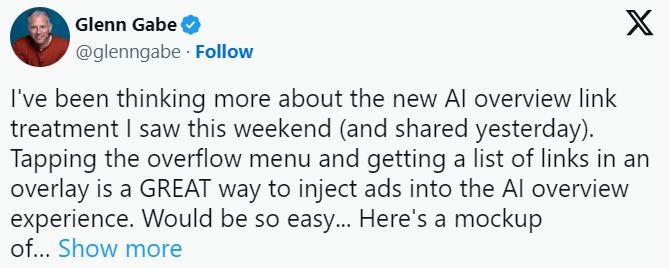
Screenshot taken from X
Hopefully, this means that AI Overviews will be getting better at attributing its data. Additionally, the link icons present more opportunity for publishers to get their URLs into generative search results and pull in some clicks.
Full-page AI Overviews for local search are on the way
Google showed that AI Overviews could produce a full SERP of organised results during their 2024 I/O Keynote.
In July, they pushed this idea forward by testing full page generative responses for local search queries.
As traditional blue link listings aren’t included in these pages, the more prevalent full-SERP AI Overviews become, the more important it will be to work AI SEO tactics into digital marketing strategies.
Bing Search
Bing introduces a new generative feature
Bing is currently testing a new generative search feature called Generative Search Experience (GSE). This isn’t to be confused with Search Generative Experience (SGE), Google’s nixed name for AI Overviews.
Unlike Google’s AI Overviews, GSE places a stronger emphasis on linking to external sources, with a dedicated panel listing links to source websites beneath the generated answer.
Traditional search results are displayed alongside the GSE response, a format with good and bad implications for organic traffic.
On the one hand, websites don’t lose their hard-won visibility should they not make it into the GSE snippet. On the other, user attention is split and traditional results don’t occupy anywhere near as much SERP real estate, meaning CTR could well go decline if GSE snippets become a common occurrence.
Reddit blocks Bing from crawling its content
Reddit has blocked Bing from crawling its platform and using its content in generative search responses.
This development could affect the quality and diversity of content available in Bing’s generative search features - although, Reddit’s visibility in AI Overviews has all but guttered out too.
“This is not at all related to our recent partnership with Google,” stated Tim Rathschmidt on behalf of Reddit to The Verge. “We have been in discussions with multiple search engines. We have been unable to reach agreements with all of them, since some are unable or unwilling to make enforceable promises regarding their use of Reddit content, including their use for AI.”
Bing tests new placement for search suggestions
Bing is experimenting with placing related search suggestions directly under the search bar.
This could potentially encourage quicker browsing and less scrolling through search results, which may increase competition for the upper-most positions on page 1 of Google’s SERPs.
Bing lays down the law on prompt injection
Bing has updated its webmaster guidelines to address prompt injection.
Prompt injection is defined by the IBM as ‘a type of cyberattack against large language models (LLMs). Hackers disguise malicious inputs as legitimate prompts, manipulating generative AI systems (GenAI) into leaking sensitive data, spreading misinformation, or worse.’
Prompt injections can be hidden in the content an LLM crawls. These are called indirect prompt injections, and they can be used to manipulate AI into serving biassed responses that encourage users to carry out actions beneficial to the host website.
Bing’s guidelines now warn that websites using prompt injection tactics may face severe penalties, including demotion or complete delisting from its index.
Bing could be testing a SERPs voting system
Bing may be testing a voting system within its SERPs, although it's unclear if this is an intentional feature or a bug.
Much like Reddit, this feature gives users the option to up or down vote search listings. Vote distribution can also be checked by users using this feature.
Would votes impact visibility as they do on Reddit? Would it impact CTR? No one knows yet, but we’ll keep you updated.
OpenAI
OpenAI launch their Google challenger AI search tool
On July 25th, OpenAI announced the launch of SearchGPT - or a ‘temporary prototype’ of it anyway.
SearchGPT is OpenAI’s answer to Google’s AI-powered search facilities, AI Overviews and Gemini. Speaking of, the UI appears quite similar to Gemini, but the company claims that this new entry into the generative search market is built to outperform Google’s AI services in terms of user experience.
Very little is known about the inner workings of SearchGPT, but it doesn’t appear to have any direct link to Microsoft Bing as ChatGPT does. Instead, it relies on a custom-built browsing system to retrieve real-time information from the web.
As we said in our AI & Digital Marketing May Round-Up, SearchGPT could be a real contender - and a real thorn in Google’s side.
It’s testing at the moment. You can join the waiting list to use it here: https://chatgpt.com/search
Paid media
Google updates Performance Max reporting & image editing tools
Google has rolled out several key updates to Performance Max reporting.
Asset-level conversion reporting
Asset-level conversion reporting lets advertisers analyse and optimise individual assets for better performance. This feature is now available globally.
YouTube video URLs & brand safety verification
Advertisers can now see the specific YouTube video URLs where their ads are being served within the standard Placement report.
Google has also introduced third-party brand safety verification for YouTube and Display inventory, giving advertisers more control over where ads appear.
Image editing tools
The image editing tools in Google Ads have been expanded. These tools, available across all relevant campaign types, now enable the adding, removing, and replacing of objects within an image. There’s also a new tool for cropping to different aspect ratios.
Click-to-WhatsApp ads introduced by Google Ads
Google Ads has introduced a new feature allowing advertisers to add a direct link to their business’s WhatsApp account in their ads.
Known as click-to-WhatsApp ads, this feature enables customers to easily initiate conversations with businesses, potentially increasing engagement and conversion rates.
AI-powered image import & editing from Merchant Center
Google Ads now allows advertisers to import product images directly from their Merchant Center into their asset library.
These images can then be edited and enhanced using AI-powered tools to create new visuals for campaigns.
'For your consideration' ad type in testing
Google appears to be testing a new ad format called ‘For your consideration.’ Spotted by Adam Bradley, this ad type features a second row of sponsored placements beneath the normal row, directing users to business sites relevant to their query.
As shown in the below screenshot posted to X by Bradley, this ad type was appearing for accommodation queries. However, this format could well expand to other industries, offering new opportunities for advertisers to reach their target audiences.
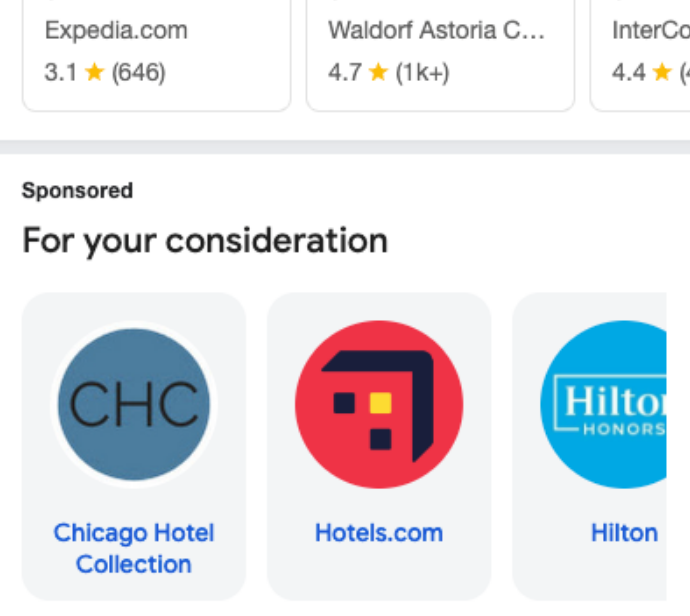
Screenshot taken from X
New budget controls for Local Service Ads (LSAs)
Google’s Local Service Ads (LSAs) now include budget options that allow advertisers to set spending limits. This new feature helps advertisers keep their campaigns within budget while maximising their reach.
Bing Ads introduces brand exclusion function
Bing Ads has added a brand exclusion feature, enabling advertisers to control which brands their ads are associated with. This function helps protect brand reputation by preventing ads from appearing alongside undesirable content or competitors.
Stay current with TDMP
Things have been lively in the search industry lately - to say the least! And August is fixing to be even more eventful — we’ll keep you in the loop.
At TDMP, we’re dedicated to bringing you all the essential updates to Search, so you can make informed decisions about your marketing campaigns.
Contact us today for comprehensive digital marketing support.

